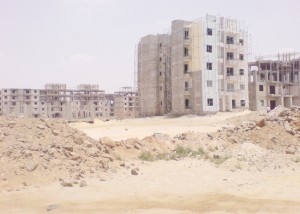
(DNE File Photo)
The Egyptian government has not done enough to guarantee the poor’s rights to adequate housing since the adoption of the new constitution earlier this year, said the Egyptian Initiative for Personal Rights (EIPR).
In a Tuesday statement the rights watchdog said that of the EGP 11.2bn allotted for investments or subsidies for various state-sponsored housing projects in the 2014-2015 budget, only .5%, or EGP 60m is likely to help the poor.
A report released this month by the EIPR criticised the Egyptian government for its lack of transparency of funding allocations, while other parts of the report described the current low-income housing plan as inaccessible to those in need.
“An analysis of the 2014/2015 budget demonstrates that the government is not interested in supporting the poor and enabling them to exercise their right to adequate housing,” read the report.
“The government…has little interest in financial support for housing.”
The National Social Housing Program (NSHP) was created in 2012 to assist “Egyptian citizens who dream of having an affordable flat,” according to the Ministry of Housing.
The Social Housing Project (SHP) run by the NSHP is divided into three programmes: one for low income earners, one for the middle-class and another for the affluent, but information about how much funding is dedicated to each part is unclear.
“No breakdown of how much each of these projects costs is available. Thus, it is unknown how much real spending is going specifically to the ‘Social Housing Project’ for low-income families, rendering claims by the government that allocations for this project are ‘contributing to the achievement of social justice for Egypt’s citizens’ highly dubious,” read the statement.
“In addition there seems to be no clear plan for the NSHP and no bias towards the poor.”
The report also faults the government for creating low-income housing based on a mortgage system.
“A mortgage, like any loan, sets a minimum threshold for the beneficiary, or a mortgage-to-income ratio, which should account for no more than 25% of the family’s monthly income by law,” read the report. “Based on the cheapest mortgage payment for a 75-metre unit—EGP 480 per month—the mortgage applicant’s monthly income must be at least EGP 1,920 a month, or EGP 23,000 a year,” read the report.
“This salary puts the beneficent family in the middle-income bracket, thereby excluding the poor.”
The EIPR has been critical of the SHP in the past. In an April report, the EIPR said that the SHP prevents 50% of the lowest-income Egyptian from qualifying for housing assistance.
Article 78 of the 2014 constitution stipulates: “The state guarantees citizens the right to decent, safe and healthy housing, in a way that preserves human dignity and achieves social justice.”
Neither the EIPR nor the Ministry of Housing could be reached for comment.


